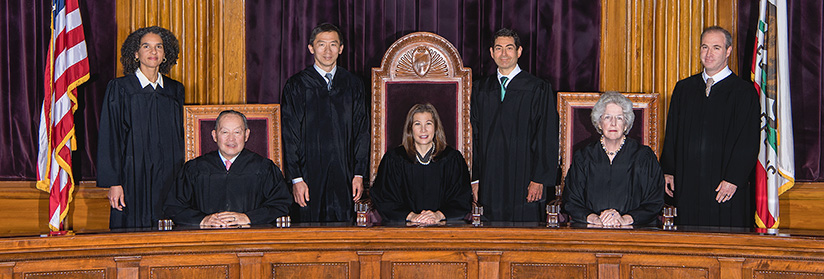
California Supreme Court Justices (courts.ca.gov)
Ferra v. Loews Hollywood Hotel: Did the CA Supreme Court Get It Right?
The court here wrongly did not recognize that employers have long relied on a practice entirely different than what the court expressed
By Chris Micheli, October 15, 2021 10:00 am
Does the phrase “regular rate of compensation” mean the same thing as “regular rate of pay”? Yes, according to the California Supreme Court. But did the state’s highest court get it right?
On July 15, 2021, the California Supreme Court issued a 7-0 decision in the case of Ferra v. Loews Hollywood Hotel, LLC. The court ruled that the phrase “regular rate of compensation” is the same as “regular rate of pay.” In other words, these two phrases are statutorily synonymous. The high court also ruled that its decision applies retroactively.
This case raises two important legal questions. First, was a fundamental canon of construction properly applied by equating two different phrases used in two different areas of the Labor Code? Second, when the regulated community has relied in good faith upon one interpretation of the law that the court overruled, should the regulated community be held retroactively liable?
Canon of Statutory Construction
The trial court in this case granted summary judgment to Loews, the employer, because the judge ruled that “regular rate of compensation” in not interchangeable with “regular rate of pay.” The first phrase is used for determining the proper amount of premium pay, while the second phrase is used for determining the proper amount of overtime pay.
The court of appeal affirmed the trial court’s ruling and relied upon the canon that, when different words or phrases are used in the same connection, the presumption is that the Legislature intended a different meaning. It determined that the statute’s plain language, federal case precedent, and the statutory history all indicate a difference between the “regular rate of compensation” and the “regular rate of pay.”
Nonetheless, the state Supreme Court reversed. It held that, when statutes use synonymous words or phrases interchangeably, they should be understood to have the same meaning. In this case, the high court said both of the Labor Code provisions use the term “regular rate” and that “compensation” and “pay” are used interchangeably in legislative and judicial contexts. As a result, these two terms mean the same thing.
The Supreme Court rejected the appellate court’s application of the canon of statutory interpretation that “a lawmaker is presumed to intend a different meaning when it uses different words in a statutory scheme.” It instead applied a different principle of construction that provides that “where statutes use synonymous words or phrases interchangeably, those words or phrases should be understood to have the same meaning.”
The court concluded that the Legislature and the courts had used the terms “pay” and “compensation” interchangeably, and thus the court interpreted the legislature’s intent to apply the same meaning to both terms. It reasoned that the operative term is “regular rate” and that there is not any legislative history or support for a contradictory interpretation of regular rate of compensation. Instead, the court found the terms were used interchangeably in legislative sessions, court decisions, and by the IWC. Similar terms, the court said, should be given consistent meaning.
But what about the modifiers that are different between the two terms – “of pay” and “of compensation”? The State Supreme Court largely ignored the words that follow in both phrases (“regular rate”). And what about the fact that the first time we see “regular rate of compensation” is in Wage Order No. 5-2001, where the Industrial Welfare Commission (“IWC”) uses this phrase to describe payments owed for meal period violations and “regular rate of pay” for payment for overtime?
Moreover, why would the IWC intentionally use two different phrases in the same Wage Order if it meant for the phrases to be synonymous? And why would the Legislature adopt those different phrases into law if it intended for them to be synonymous? The Supreme Court glossed over these questions and its ruling effectively makes “of compensation” and “of pay” entirely superfluous.
And what about the fact that these two terms are found in entirely different areas of the Labor Code – one for meal and rest break violations and one for overtime pay? If two different terms are used in two different areas of the law, why would the canon of construction not apply? Most employers in this state previously understood the terms to have different meanings. Now, they are in the process of changing their calculations for pay to employees.
Retroactive Application
The employer in this case – Loews – also argued that the court’s decision should only apply prospectively. However, the state Supreme Court rejected that approach because it said that judicial decisions generally apply retroactively, including when a court decision interprets a statute.
To make matters worse, just like in its Vazquez v. Jan-Pro Franchising International, Inc. decision from earlier this year, the court ruled that there were no considerations of fairness or public policy to warrant applying their decision only prospectively. This means that the decision will apply to past practices that have already taken place, so long as the three or four-year statute of limitations has not expired.
With its Ferra decision, the court created exposure for California employers that acted in good faith relying on prior court cases and legal counsel trying to comply with the law by paying premium pay at the base hourly rate. The court said they were wrong to do so. Now, California employers could experience a new wave of class action and Private Attorney General Act (PAGA) lawsuits based on this decision, which often serve primarily to enrich the plaintiff’s bar rather than workers.
This decision could also mean that California employers face staggering penalties despite their good faith efforts to comply with the law. The court here wrongly did not recognize that employers in this state have long relied upon a practice that is entirely different than what the court expressed. Even if you agree with the Supreme Court’s analysis of the two different statutory phrases, the court’s recent propensity to make changes in statutory interpretations retroactive has come at great cost to California’s employers.
- An Historic Look at Bill Introductions in the California Legislature - February 21, 2026
- Construction of Eminent Domain Law - February 21, 2026
- Deposition of Expert Witnesses - February 20, 2026





In California, employers are “enemies of the people.”